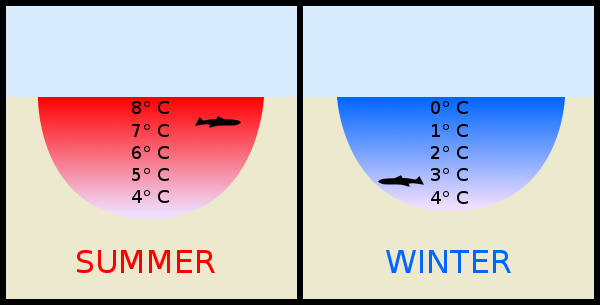Whether and how long it takes a pond or other body of water to freeze depends on several factors. Air Pressure, TDS (total dissolved solids, or salts), motion of the water itself and the temperature of the surrounding environment.
Air Pressure - Mostly a function of altitude, the pressure of the air effect the pressure of the water , with water under higher pressure requiring lower temperatures to freeze. https://physics.stackexchange.com/questions/60170/freezing-point-of-water-with-respect-to-pressure
TDS - Total dissolved solids, mostly salts and other ions lower the freezing point of water up to a point and depending on the specific chemicals and concentration dissolved. In fresh water ponds this is unlikely to mean more than 1 or 2 degrees difference. https://www.troublefreepool.com/threads/17456-Quantifying-TDS-constituents-affect-on-freezing-point-of-H20
Motion of the water. Moving water tends to inhibit ice crystal formation and delay freezing. https://www.physicsforums.com/threads/temperature-needed-to-freeze-moving-water.515414/
Temperature of the surrounding environment. In general with outdoor water like ponds and lakes, the ground underneath the body of water will remain close to the average yearly temperature. The air above the pond will have to remove enough heat from the pond to overcome all these factors.
Water also has the unique(?) property of decreasing in density as it freezes. This means that ice, which forms will form at the surface where the water tends to be warmer to begin with. In the liquid portion of the pond, convection will bring heat from the earth under the pond to the surface, which delays ice formation. The cold water moving down tot he bottom is subjected to increasign pressure, lowerign its freezing point, so that even once it reqaches the freezing point at the surface, it will not freeze as it moves down towards the warm earth.
The net effect of all this is that the entire body of water must reach the freezing point before ice will be able to form. The deeper the pond/lake, the longer it takes and a deep enough body of water will never completely freeze under normal earth conditions. As the ice layer forms on the surface, it acts to insulate the water below it, reducing the amount of heat the air can remove, but the ice doesn't form on the pond bottom, so it continues to receive heat from the earth. So the pond never fully freezes if it is deep enough and the winter short enough.
